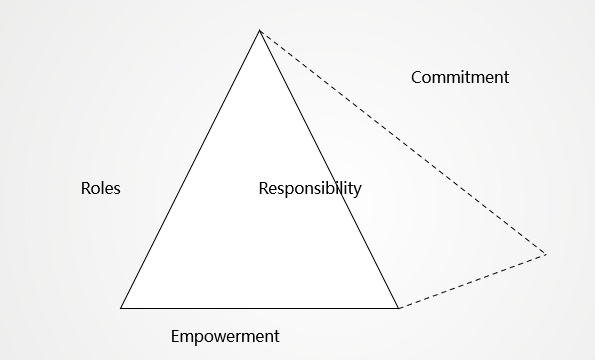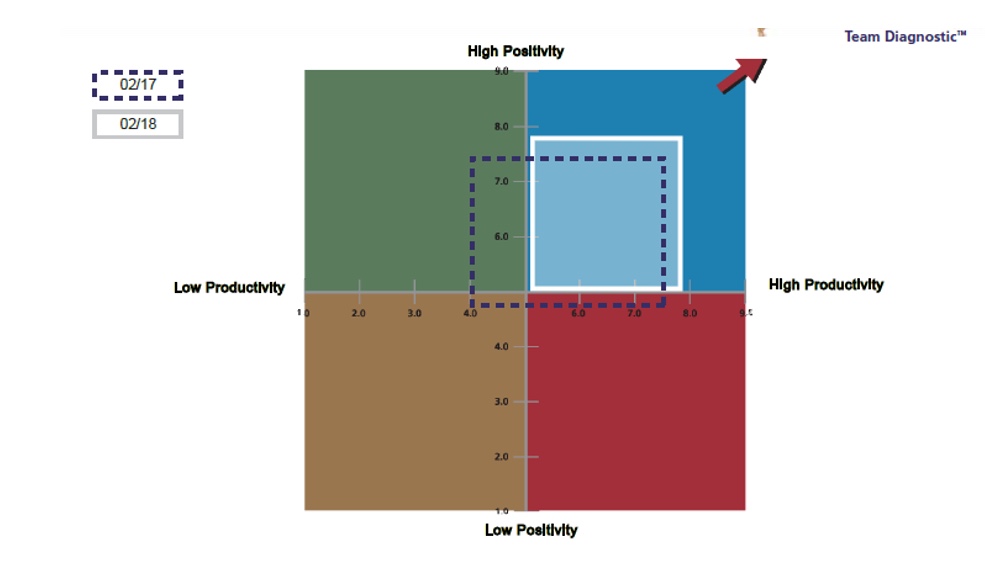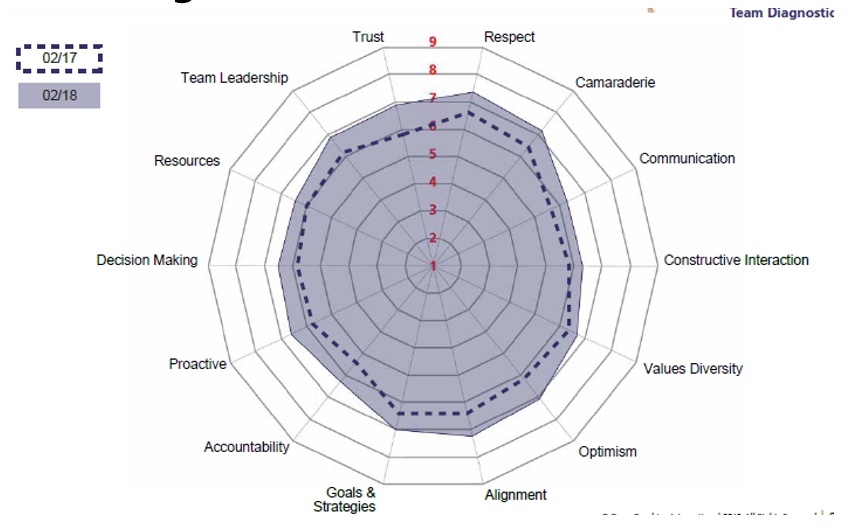Faced with market contraction, managerial discord, and declining team morale, a traditional joint venture manufacturing company successfully broke through adversity by introducing Talent Insight’s team coaching system. Beginning with the TDA™ (Team Diagnostic Assessment), and progressing through a structured “Reveal – Follow up Coaching – ROI Review” path, the project focused on key themes such as communication, accountability, trust, and transformation to continuously drive organizational behavioral change. After one year of team coaching, team productivity and Positivity improved by 12%, turnover increased by 28%, and employee satisfaction rose by 12%. This case strongly demonstrates that team coaching can not only unleash organizational potential but also help build long-term resilience and collaborative advantage – offering a replicable path and methodology for other companies undergoing transformation.
This company is a 30-year-old Sino-foreign joint venture manufacturing enterprise. Once a major player in the industry due to its technical edge and market insight, it underwent key changes in the past five years, including product integration and plant relocation. More critically, it faced a shrinking market and waning customer demand, forcing it to find new direction amidst uncertainty.
At the same time, three major challenges emerged:
External challenges: shrinking market, reduced customer orders, and annually rising labor costs.
Internal conflicts: significant strategic and cultural differences between Chinese and foreign partners, resulting in inconsistent management and contradictory directives.
Employee confusion: frequent changes and top-level disagreements led to low morale on the frontlines, chaotic cross-functional collaboration, and severely damaged trust within the team.
Talent Insight intervened with a four-step systematic team coaching program: “TDA Assessment + Result Reveal Workshop + Follow-up Coaching + ROI Review,” carried out over one year.
Using TDA™ (Team Diagnostic Assessment), the current team status was comprehensively evaluated. Fourteen key factors were used to quantitatively assess collaboration, trust, accountability, and readiness for change, giving a clear, realistic picture of the team’s condition.
The team coaching began with a kickoff workshop. Through data presentation, team interpretation, case sharing, and interactive dialogue, team members gained intuitive understanding of current challenges and discovered potential opportunities. This collective awareness and consensus laid a cognitive and cooperative foundation for subsequent change.
During the in-depth coaching stage, a series of structured coaching sessions addressed six core themes: Communication – Constructive Interaction – Accountability – Trust – Proactive – Alignment. These sessions helped shift the team from awareness to actual behavioral change.
Faced with millions of euros in inventory backlog and finger-pointing among departments, the team coaching introduced an accountability model. Members were guided to recognize the critical role of “commitment” in ambiguous situations. Through modeling and reflection, they developed a “take ownership amidst ambiguity” mindset, enhancing cross-functional cooperation and initiative. HR also optimized staffing and role definitions based on this, driving management improvements.
Addressing communication barriers caused by cultural differences, the coaching identified destructive behaviors and gradually built a culture of open feedback and positive expression. Team members began to handle conflicts and disagreements more constructively, significantly improving communication efficiency and collaboration.
In workshops focused on communication, trust, change, and alignment, coaches used simulations, case analysis, and role swaps to help team members step outside their departmental silos and enhance cross-functional understanding. For example, role reversals encouraged empathy, while real-world drills improved communication and adaptability. These interventions, reinforced by regular reviews and feedback, became embedded work habits, effectively integrating coaching outcomes into daily operations.
Through regular reviews, coaching meetings, and key action commitments, the project continually reinforced its outcomes. Coaching language was incorporated into daily management, gradually forming a new culture of “shared understanding and accountability.”
Outcome Measurement|Comprehensive Improvements from Soft to Hard Metrics


Quantitative Results (Before and After TDA Comparison):
Productivity: +12%
Positivity: +12%
Communication: +13%
Constructive Interaction: +9%
Accountability: +17%
Trust: +19%
Proactive: +16%
Alignment: +13%Business Results:
Overall revenue increased by 28% year-over-year
Employee satisfaction rose by 12%, with several indicators ranking first within the global group
This transformation went beyond metrics—it catalyzed a deep cultural shift: from a defensive, internally conflicted organization to one that is consensus-driven and action-aligned.
This joint venture’s transformation journey demonstrates that the greatest breakthrough in organizational change doesn’t come from systems or processes, but from team awakening.Team coaching is an intervention that puts people back at the center of management. It helps organizations:
See the real situation (diagnosis)
Integrate diverse perspectives (consensus)
Break behavioral inertia (coaching)
Establish collaboration mechanisms (implementation)
True sustainable growth comes from a team’s ability to self-reflect and adapt. For any organization seeking a breakthrough and rebirth, team coaching is not a luxury – it’s a strategic long-term investment.
Copyright Notice: This content and data are published with the company’s authorization. The methodology originates from the Talent Insight Team Coaching System. Please credit the source when sharing.
From Deadlock to Breakthrough: How Team Coaching Transformed a Joint Venture Manufacturer
What happens when a 30-year-old manufacturing company faces market decline, cultural conflict, and low morale?
They turned to team coaching – and achieved a 28% revenue increase, 17% accountability improvement, and a 12% rise in employee satisfaction.
In our new Team Coaching White Paper, discover how Talent Insight guided this joint venture through a year-long transformation, using our proven “TDA – Results Reveal – Follow-up Coaching – ROI” approach.
🔍 Real data.
💡 Measurable culture change.
🤝 Stories of trust, ownership, and breakthrough.
📘 Read the full case: [Insert Link]
Let’s reimagine what teams can do — together.






Copyright 2026 @Talent Insight. All Rights Reserved